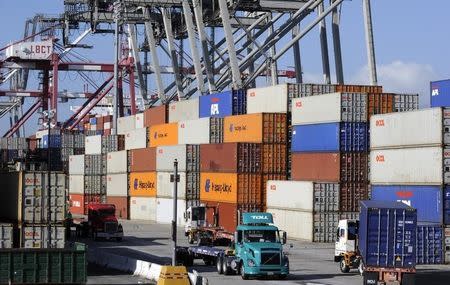U.S. trade deficit hits 11-month low; private payrolls increase
By Lucia Mutikani
WASHINGTON (Reuters) - The U.S. trade deficit fell to an 11-month low in November as declining crude oil prices curbed the import bill, eclipsing a drop in exports that could be related to a labour dispute at one of the nation's key ports.
Other data on Wednesday showed private employers stepped up hiring last month, a sign the U.S. economy was still sailing along despite slowing growth abroad.
The Commerce Department said the trade gap narrowed 7.7 percent to $39 billion, the smallest since December 2013.
When adjusted for inflation, the deficit fell to $47.8 billion from $50.1 billion in October, probably not enough to change views trade would be a drag on fourth-quarter gross domestic product.
Trade contributed 0.8 percentage point to the third quarter's robust 5.0 percent annualised growth pace, which was the fastest in 11 years.
Growth estimates for the fourth quarter are currently between a 2.5 percent and 3.0 percent rate. In addition to trade, inventory accumulation is also expected to restrict growth after businesses restocked warehouses faster than had been anticipated in the third quarter.
But with lower gasoline prices and a tightening labour market expected to provide a tailwind to consumer spending, the outlook is bullish for the economy in 2015.
The firming labour market was underscored by the ADP National Employment Report, which showed private payrolls increased 241,000 in December after rising 227,000 in November,
The report, jointly developed with Moody's Analytics, came ahead of the government's more comprehensive nonfarm payrolls report on Friday, which includes both public and private sector employment.
U.S. stock index futures extended gains on the employment report. The dollar was trading higher against a basket of currencies.
In November, imports dropped 2.2 percent to $235.4 billion, the lowest since last February. The value of petroleum imports was the lowest since August 2009, pushing the petroleum deficit to its lowest level in nearly 11 years.
A domestic energy boom has enabled the United States to reduce its dependence on foreign oil, easing pressure on the current account deficit. In November, the quantity of crude oil imports was the lowest since February 1994.
The average import oil price dropped to $82.95 per barrel in November, the lowest since December 2010, from $88.47 in October.
Lower oil prices should help to temper the impact of non-petroleum imports, which are expected to rise because of strengthening domestic demand and a firming dollar.
Exports fell 1.0 percent to $196.4 billion in November. Both exports and imports might have been hobbled by a labour dispute at West Coast ports, which has been cited by businesses as causing delays in the movement of goods.
The decline in exports could also be an early sign that a slowing global economy was starting to undercut demand for U.S.-made goods.
Exports to the European Union fell 7.7 percent, while those to Canada and Mexico - the main U.S. trading partners - also dropped sharply. Exports to Japan tumbled 9.7 percent.
Exports to China fell 3.9 percent, while imports from China dropped 6.9 percent, leaving the politically sensitive trade gap down 8.0 percent at $29.9 billion.
(Reporting By Lucia Mutikani; Additional reporting by Richard Leong in New York; Editing by Andrea Ricci)





